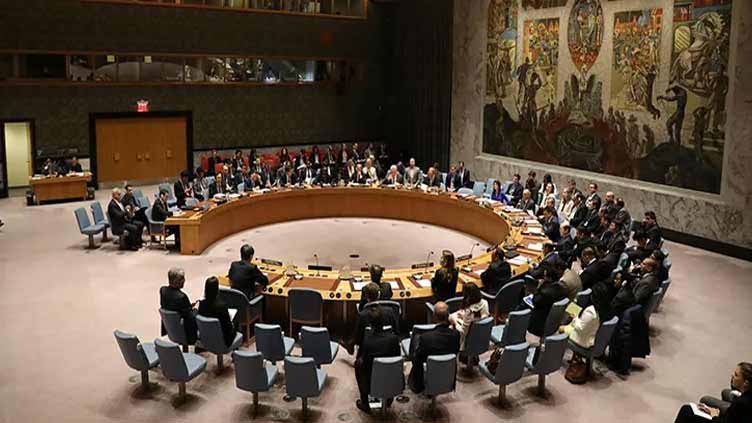UN Security Council calls emergency meeting amid aggravation in Middle East

World
UN Secretary General António Guterres once again called for an immediate ceasefire
GENEVA (Web Desk) – A day after Iran struck back against Israel after launching a slew of missile attacks in Tel Aviv following killing of top leadership of Hezbollah by the Zionist state, the United Nations Security Council called an emergency meeting on Wednesday to discuss ways to avoid escalation in the Middle East.
Recent episodes of bloody confrontation between warring parties of the Middle East brought the matters on edge, culminating into a full-blown conflict in the powder keg region of West Asia.
United Nations Secretary General António Guterres once again called for an immediate ceasefire while British Prime Minister Kier Starmer condemned Iran’s attack on Israel by reaffirming Britain’s unwavering support for Israel’s defence. The British PM urged Iranian leadership to abandon support for proxies aiming to target the Zionist state.
Earlier, United States of America President Joe Biden also vowed to stand by Israel come what may.
IRAN LAUNCHES SALVO OF BALLISTIC MISSILES
Iran fired a salvo of ballistic missiles at Israel in retaliation to the latter’s campaign against Tehran’s Hezbollah allies in Lebanon and the killing of its chief and that of Hamas.
Alarms sounded across Israel and explosions could be heard in Jerusalem and the Jordan River valley after Israelis piled into bomb shelters. Reporters on state television lay flat on the ground during live broadcasts.
Reuters journalists saw missiles intercepted in the airspace of neighbouring Jordan. Israeli media reports said as many as 100 missiles had been launched.
After about an hour, the military announced there was no longer a threat and “it was decided that it is now permitted to leave protected spaces in all areas across the country”, with a “large number” of Iranian missiles intercepted.
Reports said between 150 and 200 missiles had been fired in the attack.
It was Iran’s second on Israel after a missile and drone attack in April in response to a deadly Israeli air strike on the Iranian consulate in Damascus.
Israel vowed to retaliate with an army spokesman saying it would respond at the time and place of its choosing.
“This attack will have consequences. We have plans, and we will operate at the place and time we decide,” said Israeli military spokesman Rear Admiral Daniel Hagari.
Emergency services said at least two people sustained light injuries during the missile attack.
“Currently, there are no reports of injuries from the fire towards Israel, except for two light injuries from shrapnel in the Tel Aviv area and some minor injuries nationwide while moving to safe spaces,” a Magen David Adom emergency service statement said.
Iran’s Revolutionary Guards said the missile attack was in response to the killing of Hezbollah chief Hassan Nasrallah last week as well as that of Hamas leader Ismail Haniyeh.
“In response to the martyrdom of [Hamas leader] Ismail Haniyeh, Hassan Nasrallah and [Guards commander] Nilforoshan, we targeted the heart of the occupied territories (Israel),” the Guards said in a statement reported by the Fars news agency.
The Guards threatened to carry out “crushing attacks” against regional Israel if it retaliated after the missile attack.
“If the Zionist regime reacts to Iranian operations, it will face crushing attacks,” the Guard said.
Iran’s Supreme Leader Ayatollah Ali Khamenei gave the order to launch missiles at Israel, a senior Iranian official told Reuters, adding that Tehran “is fully ready for any retaliation.”
Iran’s mission to the United Nations in New York posted on X that the attack on Israel is a “legal, rational, and legitimate response to the terrorist acts.”


